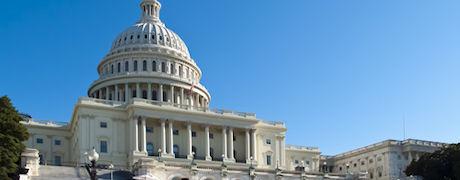Debate Heats up on Proposed EPA Water-Quality Rule
Source: Kate Campbell; Ag Alert
Discussion has intensified about proposed changes to the Federal Clean Water Act. As farmers and ranchers express increasing concern about enhanced permitting requirements, land-use restrictions and legal liability that the proposal could cause, the U.S. Environmental Protection Agency launched its own campaign to defend the proposal.
Agricultural leaders want the EPA to scrap the proposed rule changes, terming them a poorly orchestrated attempt to expand agency jurisdiction. The proposed rule was published in April, and remains open to public comment until October.
County Farm Bureaus in California are joining the national push to have the proposed rule changes withdrawn, reaching out to members of the state’s congressional delegation and urging the proposal be stopped.
Meanwhile, the EPA called its proposals merely an effort to clarify regulatory jurisdiction, which was called for in two U.S. Supreme Court decisions that ruled against the agency’s attempt to expand its jurisdiction over “waters of the United States.” EPA said the proposed rule would have minimal economic impact and would not affect many acres—only about 1,300 acres nationwide.
The American Farm Bureau Federation called that assertion “laughable,” considering the amount of land nationwide that has the capacity to retain seasonal moisture, a condition covered by the proposed rule. Under the proposal, legal experts say, wet spots could be deemed “waters of the U.S.”
AFBF said the EPA effort to expand its jurisdictional authority over most types of waters and lands is regulatory overreach that has the potential to impose costly and time-consuming federal permit requirements, as well as place limits on routine farming practices, such as building a fence across a ditch or pulling weeds. Essentially, EPA has proposed regulations that fundamentally redefine “waters of the U.S.” and eliminate the term “navigable” from the law, AFBF said.
“We’re urging Congress to take a look at the proposed rules and we’re urging the agency to withdraw both of them,” California Farm Bureau Federation Federal Policy Manager Rayne Pegg said, referring to both the main EPA proposal redefining “waters of the U.S.” and an “interpretive rule” that focuses on agricultural activities.
Pegg stressed that farmers recognize the need to protect water quality, and already abide by a number of water-quality regulations.
“Adding another layer of regulation does not mean you will get better results,” she said. “Instead, the rule will create more paperwork. It’s a poorly conceived rule. EPA should meet with farmers and listen to its own Scientific Advisory Board to craft something that is practical.”
There are a number of things going on in Congress right now related to these rules, she said, and CFBF has been responding to questions from members of congressional committees—including the House Appropriations Committee, which is considering legislation to remove funding for implementation of the proposed waters of the U.S. rule.
In response to the uproar over the proposal, EPA Administrator Gina McCarthy took to the road last week—touring a Missouri farm and meeting with a number of Kansas farm groups. She acknowledged during a lunch discussion with agricultural leaders the waters of the U.S. proposal has “fallen flat on its face.”
But during a speech in Kansas City, she charged that the EPA proposal has been beset by “D.C. myths.”
“Misinformation is becoming the story, while the legitimate, serious issues that we need to talk about are taking the back seat,” McCarthy said.
At the same time McCarthy visited the Midwest, the Natural Resources Defense Council—an environmental organization—took out advertisements supporting the EPA proposal.
Confusion about what the proposed rule may actually cover and conflicting interpretations of the rule changes may leave political leaders with the impression the proposal is benign and that farmers don’t need to worry, said CFBF associate counsel Kari Fisher.
“EPA would like political leaders and the public to believe that all farmers need to do is go ahead with normal farming practices and not worry about the proposed changes,” she said. “Unfortunately, that’s incorrect.”
Fisher said the interpretive rule on agriculture would require certain farming practices—such as putting in a new fence or maintaining a ditch—to comply with U.S. Department of Agriculture standards administered by the Natural Resources Conservation Service. She noted that the interpretive rule would apply only to Section 404 of the Clean Water Act, which covers dredging and infilling land that could affect wetlands.
But the proposed rule to expand the definition of “navigable waters” applies to the entire Clean Water Act, she said, and would expand EPA jurisdiction over water.
“If the proposed rule redefining waters of the U.S. is adopted, farmers with land that features a depression or low spot that’s adjacent to a tributary flowing to navigable water could be brought under the rule’s jurisdiction,” Fisher said.
Although the interpretive rule might provide a limited layer of protection for farming and ranching activities from the need to obtain Section 404 permits, she said, “it will not provide protection from other necessary Clean Water Act permits, such as those for the discharge of pollutants.”
Farm Bureau leaders continue to urge members to help prevent the proposed rule from becoming final by commenting about the impact the proposal would have on their farms and ranches.
Information from EPA on the proposed changes to the CWA can be found online at www2.epa.gov/uswaters. Background information on the issue from AFBF is online at http://ditchtherule.fb.org/.
For information on arranging local farm tours, grower roundtables and informational meetings with members and staff of California’s congressional delegation, contact county Farm Bureau offices or the CFBF Federal Policy Division at 916-561-5610.










